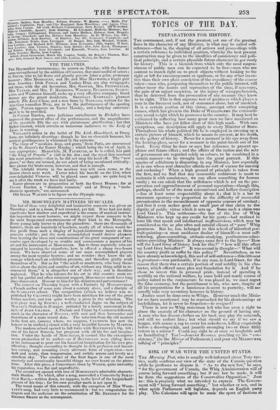MR. MOSCHELES'S MATINEES MUSICALES.
Tim last of these very delightful and instructive concerts was given on Thursday and to a room, if not crowded, yet full. If we had not daily
experience how shallow and superficial is the course of musical instruc- tion imparted to most learners, we might expect these concerts to be the most frequented entertainments of their kind in the Metropolis. Every young lady learns to play the pianoforte : there are thousands of learners, there are hundreds of teachers, nearly all of whom would de- rive profit front such a display of keyed-instrument music as these concerts exhibit ; and the most accomplished would derive pleasure front hearing the ideas and combinations of the great composers of suc- cessive ages developed by so erudite and consummate a master of his art and his instrument as MOSCHELES. But to those especially who are engaged in learning the pianoforte, here is offered a cheap two-hours lesson. We have observed some of our most accomplished players among the most regular hearers; and no wonder: they know the ad- vantage which such an exhibition presents, and therefore gladly avail themselves of it. But as for "the scioli or smatterers, who busy them- selves about the skirts and outsides of art, without any thing solid to re- commend them," it is altogether out of their way, and is therefore neglected. That he who labours for his art in this country must ex- pect but partial and often reluctant support, Mosennu:s must have long since discovered. Honour to him for his disinterested perseverance ! The concert on Thursday began with a Fantasia by MosnoNvir,rx, a French author of some note about a century since, and a disciple of the SeAuLArrr school. The composition (which we believe was re- published by CitAreEt.) might have been mistaken for one of the great Italian masters, and was quite worthy a place in the selection. The next piece was by lumen'. ; a well-conducted fugue on the subject of MozA mr's Sinfinda in D major, preluded by a lovely movement in the style of Jens: CRAMER. A Prelude and Fugue by ChIIclENTzfollowed, much in the character of HANDEL, with now and theta harmonies and transitions of a more recent date. The selection from the old masters in the first act, (among whom, we suppose, Cmonwri has now the honour to be ranked,) closed with a very beautiful Lesson by MARTIN!. The modern school opened in full force with Ilms:rnovEN's Op. 106 ; one of his latest Sonatas, but pregnant with all his fire and imagina- tion. Under the hands of MosctumEs, it scented like the extempora- neous production of its author—as it' IlEurnovtix were sitting down at his instrument to pour out his luxuriant imagination for his own gra- tification ; thought succeeding to thought in rich profusion and bound- less variety, and assuming every alternate form of expression—now dark and misty, then tempestuous, and awhile serene and lovely as a cloudless sky. The conduct of the final fugue is one of the most masterly and occasionally beautiful things we ever heard on the piano- forte. After this piece, a Concertante Duet by WEnEn, quite unworthy his reputation, was flat and unprofitable.
The second act opened with two of MOSCHELES'S admirable characte- ristic Studies. To which, after a song, succeeded a Concerto by SEBAS- TIAN BAem—written down, we suppose, to the level of the harpsichord- players of his time ; for his own peculiar mark is not upon it. The vocal music of this concert, with. the exception of Miss Woon- I:Arr's song, had very little to recommend it : but we congratulate the singers and the audience on the substitution of Mr. BENEDICT for Sir GEORGE SMART as the accompanist.


























 Previous page
Previous page